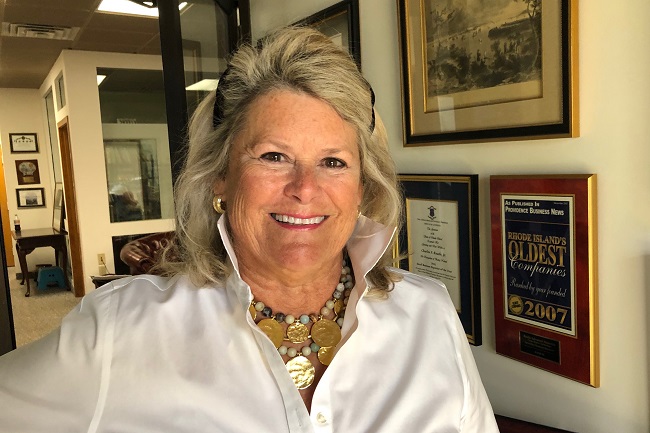
Emily Reade, president of chemical manufacturing company Reade Advanced Materials in East Providence, discusses the International Organization of Standardization’s 9001-2015 certification for small and midsized manufacturers and how her company was able to bolster customer confidence and target areas of improvement.
PBN: The certification’s impact and benefits appear to go far beyond consumer confidence. Can you explain?
READE: The ISO 9001 certification gives companies such as Reade a known “stamp of approval” in the industry as to the level of the quality of service and process customers will benefit from.
As we are a distributor of specialty chemical solids, we do not manufacture any of the products we sell to our customers and must rely on the capabilities of the vendors themselves. We have always considered Reade to be ISO compliant, but the detailed policy and documentation required for certification has made us look closely at all our vendors, their products and their capabilities to meet the specifications our customers require.
It has provided an across-the-board standardization that was implicit before but is actually realized now. We have found the requirement to schedule and hold quarterly management review meetings extremely rewarding, as it forces us to take the time out of our complex and busy schedules to sit down and go into depth [on] all our processes.
We review each segment – from the risk analysis, SWOT [strengths, weaknesses, opportunities, threats] matrix, training matrix, resource adequacy assignments – to one of the most important, which is the constant vendor evaluation. Management sits down with each account manager to review vendors’ performance indicators, such as quality and on-time delivery.
PBN: How long did the certification process take from start to finish?
READE: The certification process took close to nine months from the beginning phase through initial certification. We started this three years ago when we were fortunate enough to work with Polaris MEP, who helped us significantly in developing our policy and implementation and continues now by providing consulting and internal audits.
PBN: What are some main points about getting certified that companies should know, in terms of work required on their part?
READE: We started from scratch doing SWOT analyses, identifying objectives that support the QMS [quality management system] policy, and many detailed support documents and matrixes, such as training or tracking on-time deliveries or prioritizing risk assessments. We met for three hours almost every week in order to accomplish this. Although it was grueling at times, the final analysis is a QMS policy and process that we are proud of, can document and perform against.
Our recent recertification, required every three years, went smoothly because of the excellent tutelage we’ve had with Polaris MEP and our company taking the policy to heart after three years of implementation.
Although senior management is involved in the decisions and overseeing the QMS, additional work has been placed upon the sales staff to ensure the appropriate documentation is maintained and protocol followed as they service their customers.
Our management review meetings review all non-conformances and delve into the root causes to take remedial action as required to ensure we are on top of delivering products that consistently meet our customers’ specifications.
PBN: We hear about companies exceeding ISO 9001 compliance and improving their quality management systems as a result. Did Reade have such an experience?
READE: We have improved the level of the quality of our customer service either by tracking on-time deliveries or going the extra step to ensure specifications are met. We found through our ISO certification process that we desperately needed to upgrade our CRM [customer relationship management process], which has been done, as well as establishing and implementing a cybersecurity policy and replacing old servers by moving to the cloud.
The upgraded CRM and move to the cloud alone contributed to our ability to serve our customers in a timely manner as we worked remotely during the pandemic, and barely skipped a beat.
PBN: What would you say to companies who aren’t sure an ISO 9001-2015 certification makes sense for them?
READE: We had for many years established procedures and sales processes that we believed were ISO 9001 compliant until one of our large Department of Defense contractors insisted that we have the actual ISO certification to continue doing business with them.
A gap analysis revealed the many areas that required formal documentation of our processes and some areas of weakness, which we were able to identify. Our engagement of Polaris MEP was the wisest move we made at the outset. They were invaluable and critical in providing the guidance and education needed to establish our QMS the proper way and move through actual certification!
Susan Shalhoub is a PBN contributing writer.












